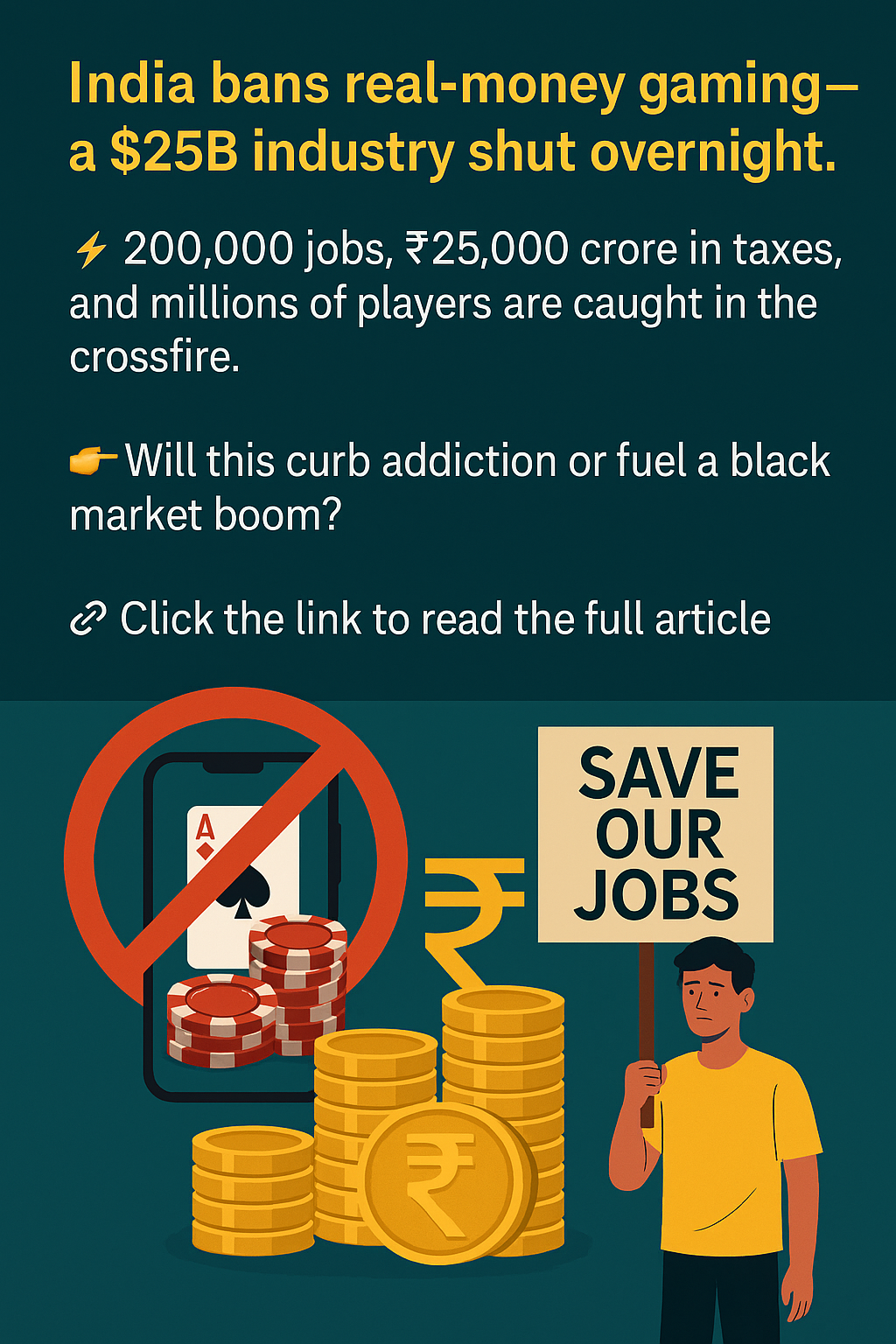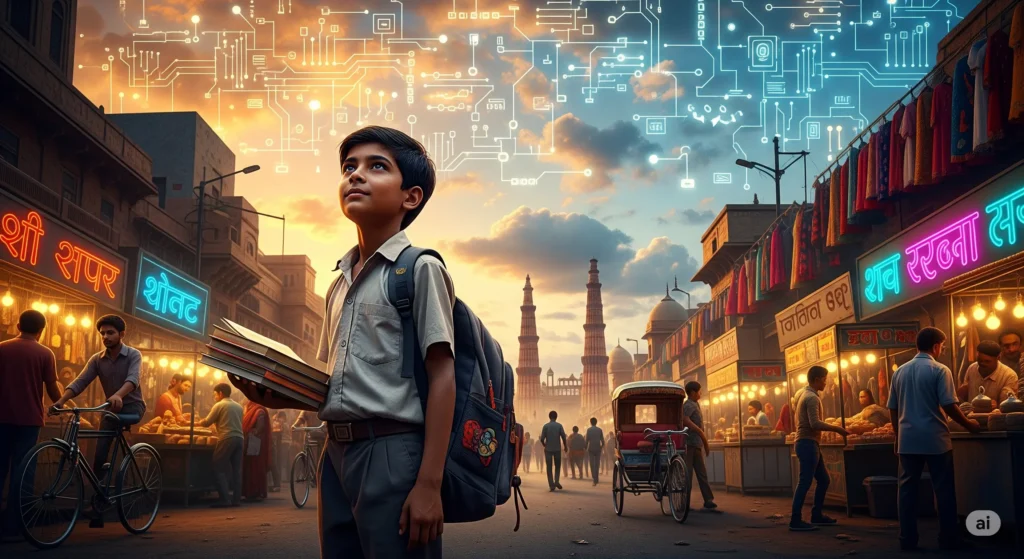 It’s the last week of August.
It’s the last week of August.
Heat and noise are swirling around India’s Parliament—inside and outside alike. Voices thunder in the Lok Sabha, slogans echo through the Rajya Sabha. And then the hammer falls: The Promotion and Regulation of Online Gaming Act, 2025 passes.
With one stroke of legislation:
Any game involving *real money* is no longer legal in India.
The Government’s Argument
> *“People are falling into debt traps. Families are breaking apart. Crores of rupees are leaking out through foreign apps. Money laundering is rampant. We must stop it now.”*
### Outside Parliament
Just a few hundred meters from the grand dome, the mood is very different.
In front of the Press Club, hundreds of young men and women hold up placards:
“Give Us Our Jobs Back.”
One young woman, her voice trembling, tells a reporter:
*“I only got this job a year ago. My family was so proud. And now the company says it’s shutting down. What am I supposed to tell them?”*
For them, the math is simple. The online gaming sector employed nearly 200,000 people directly—software engineers, data analysts, content moderators, marketing professionals, payment gateway operators. According to industry estimates, at least 20,000 workers will lose their jobs immediately, and 300 companies are likely to shut down.
But jobs are only one part of the story.
Think bigger:
* This industry was contributing ₹25,000 crore (\$3 billion) annually in taxes, including **₹20,000 crore (\$2.4 billion) in GST alone.
* The market size? A staggering **\$25 billion**, growing at over **20% annually**, with India being the world’s largest mobile gaming market by downloads.
To shutter such a sector overnight—let’s be clear—is an economic earthquake.
—
The Global Contrast
Here’s where my Caribbean experience comes in.
Most islands there have embraced iGaming, passing clear licensing laws because it’s one of their biggest sources of revenue.
* **Malta: A pioneer in online gaming regulation, where the industry contributes nearly 12% of GDP.
* Gibraltar**: Online betting employs almost **10% of its workforce, with strict but enabling laws.
* **Curacao**: Has become a global hub for offshore licenses, precisely because it recognized the inevitability of digital gaming.
*St. Kitts and Nevis: Recently passed an exemplary law distinguishing *skill-based sports* from gambling, giving each its own licensing framework.
That’s exactly where India fumbled.
By lumping together skill-based games and **games of chance**, the government blurred a crucial line.
—
### Skill vs. Chance
Take bridge, a card game of logic and calculation.
Or chess, recognized as a sport worldwide.
If a chess player can earn prize money, why shouldn’t a bridge player?
The government is right about chance-based games**: the risks of addiction, debt spirals, and fraud are undeniable. But by punishing skill-based games under the same blanket ban, policymakers revealed a lack of nuance—worse, a lack of foresight.
The result?
A thriving, legitimate, tax-paying industry strangled alongside shady gambling apps.
—
### The Shadow Market
Within hours of the law taking effect, giants like **Dream11, MPL, Zupee announced the suspension of their real-money operations in India.
But did the players stop?
Of course not.
* Cryptocurrency betting portals are already buzzing.
* **Offshore websites** are snapping up Indian traffic.
* Telegram and WhatsApp groups are mushrooming with underground “matka” betting.
Experts are warning:
*“This ban may reduce visible addiction, but it will turbocharge the black market—crypto betting, underground gambling, hawala money flows.”*
—
### The Two Battles
This story is now a tug-of-war.
* On one side, the overnment: determined to protect citizens from debt, fraud, and addiction.
* On the other, the industry and its workers: terrified of losing livelihoods, investments, and billions in tax revenue.
Caught in the middle? Ordinary citizens.
Some sigh with relief: *“Good. At least our kids won’t be trapped in this cycle.”*
Others ask: *“But will we even have the freedom to play skill games anymore?”*
—
### What Could Have Been Done
Many believe the answer was not a **ban**, but **regulation.**
* Separate **skill-based games** from **chance-based gambling**.
* Recognize **eSports** as a legitimate, taxable industry with prize pools and sponsorships.
* Provide **mental health support** for gaming addiction, as South Korea does with its “shutdown law.”
* Demand **transparent financial systems** with strict KYC and audit trails.
This was India’s chance to build a **global regulatory model**—instead, it chose prohibition.
### The Real Question
On one side lies good intention: protect people from ruin.
On the other side lies cold reality: 200,000 jobs, a \$25 billion industry, and billions in tax revenue.
If the government relies only on bans, yes—perhaps debt traps will shrink.
But the black market will swell, the jobs will vanish, and the world will once again see India as a country that confuses regulation with prohibition.
The real question before us:
Will we choose balance, or will we lose one half of the future while trying to save the other?
—
“If we save lives but kill livelihoods, have we really saved anything at all?”



